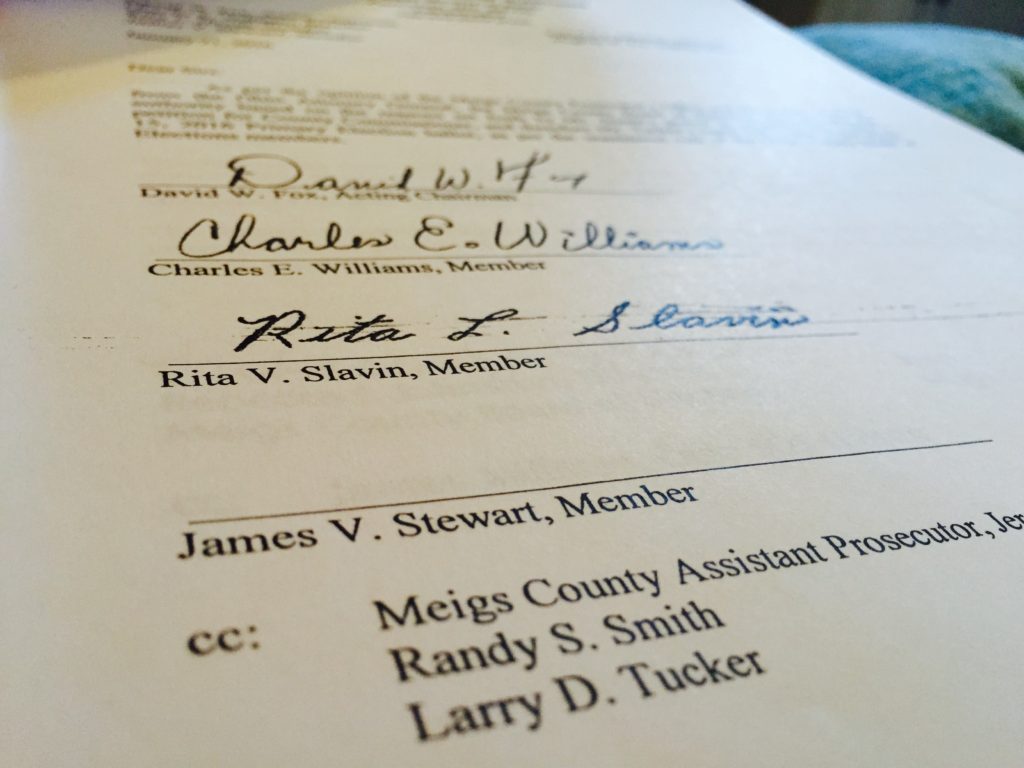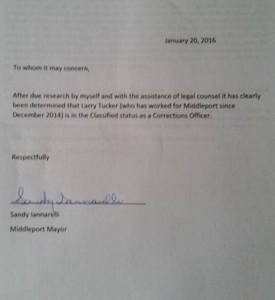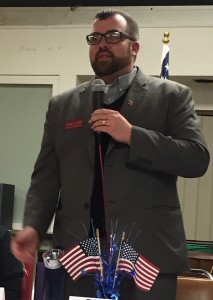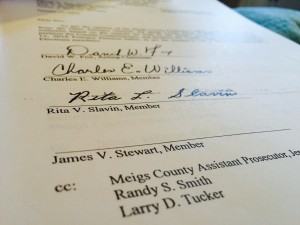Candidates, Classification, Clarification and the County Commissioner’s Race

This letter from the Meigs Count Board of Elections detailed their findings in the matter of Smith's protest.
 POMEROY – Questions have been raised concerning the candidates in the March 15, 2016 primary election for Meigs County Commissioner.
POMEROY – Questions have been raised concerning the candidates in the March 15, 2016 primary election for Meigs County Commissioner.
There are no simple answers and it goes beyond just two men vying for the same position in county government.
For most of the public, the questioning of the candidacy of Larry Tucker for Meigs County Commissioner on the Republican ticket recently came up through social media postings by opponent and incumbent, Randy Smith. Smith, however, filed a protest to Tucker’s candidacy January 4, of this year. A hearing was held on January 21 by the Meigs County Board of Elections and that is where the matter appeared to have ended. It did not. Smith eventually posted several things on social media which then caught the attention of local news media including the Meigs Independent Press. It has raised more questions than answers.
The Meigs County Board of Elections is charged with validating all petitions filed by those seeking to be elected to an office. The board validates the signatures and the candidate is certified, the name then can be placed on the upcoming ballot. The petitions for the March primary were certified on December 18, 2015.
If there is a question in the legitimacy of the candidate running once that petition has been certified, a protest can be filed by anyone including the opponent. The board then schedules a hearing to review the reason for the protest.
Filing the Protest
Smith filed such a protest according to the letter sent to the board of elections. His reason was, “Mr. Tucker is employed by Meigs County as an Assistant Bailiff, Administrative Assistant, Assistant PSI Writer and a Corrections/Probation officer. As well Mr. Tucker is employed by the Village of Middleport as a Corrections Officer. Both Meigs County and the Village of Middleport have current policies that forbid Classified Employees from certain political activity. Certified local, state, and federal employees are forbidden to participate in certain political activities including but not limited to circulating a petition for a partisan candidate in a partisan election and participating in the election as a candidate.”
Smith also stated in the letter that following his research, no record existed in the “County Audtitor’s Office nor the Court of Common Pleas that declares Mr. Tucker to be ‘unclassified’. The State Employee Review Board determines anyone who is not declared as ‘unclassified’ as ‘classified’ and they are then provided protection under the State Employee Relations Board.”
If the act of circulating the petition was illegal according to Smith, how could Tucker’s petition for candidacy be valid? This was Smith’s stance and why the hearing was convened.
Letters were sent out to Tucker and Smith dated January 13 that a hearing was scheduled for January 21.
The Hearing
The Meigs Independent Press obtained an official audio recording of the hearing from the new Director of the Board of Elections, Meghan Lee. At the time of the hearing, Lee was the deputy director. Rebecca Johnston was the director at the time, but has since retired.
David Fox was the acting chairman of the Meigs County Board of Elections. Charles Williams, Rita Slavin and Jimmy Stewart were listed as members. All were present for the hearing. Both Tucker and Smith were notified of the hearing and both were present for it. Assistant Prosecuting Attorney, Jeremy Fisher, was also present serving in the capacity of counsel to the board as a county office.
The hearing started with Fox reading the letter from Smith outlining his reason for protesting Tucker’s candidacy based on the Ohio Revised Code stating classified employees could not circulate a petition for election. Smith was given the opportunity to present his position. Smith then presented a letter from Middleport Mayor, Sandy Iannarelli dated January 20, 2016.
The letter signed by Iannarelli reads, “After due research by myself and with the assistance of legal counsel it has clearly been determined that Larry Tucker (who has worked for Middleport since December 2014) is in the Classified status as a Corrections Officer.”

Smith continued his explanation of the protest saying an unclassified employee “can be removed from the position without cause.” He also stated a letter is supposed to be in the employee file and signed within 90 days of employment that the employee is in deed unclassified or it is understood to be a classified position. Smith noted Tucker did not have a form on file stating he was an unclassified employee.
Tucker was then given the opportunity to address the board. Tucker said, “as of last night 8 p.m. both my immediate supervisors and the mayor of Middleport were unaware whether I was classified or unclassified,” and added, “So how am I to know if they don’t know.”
Tucker noted that they had “no clue” and described his work day at the village. He said he worked from 11 p.m. to 7 a.m. or until he was not needed to be able to go home.
“I don’t believe I am classified to this day because I have had no training. This came to light last night. Nobody seems to know the classification of none of it,” Tucker said.
Fox then went on to explain what the election board can and can not do according to his understanding and he referenced a letter of opinion from September 7, 2000 from then Ohio Attorney General Betty Montgomery to then Shelby County Prosecuting Attorney James Stevenson. The opinion was written in response to a question concerning a primary election and the board’s authority to remove from the general election ballot the name of a candidate that had filed for the primary election as a political party candidate eventually becoming the nominee that was in fact a Classified employee. It also addressed ORC 124.57, which Smith also used in his case for the protest.
According to the Ohio Revised Code, “(A) No officer or employee in the classified service of the state, the several counties, cities, and city school districts of the state, or the civil service townships of the state shall directly or indirectly, orally or by letter, solicit or receive, or be in any manner concerned in soliciting or receiving, any assessment, subscription, or contribution for any political party or for any candidate for public office; nor shall any person solicit directly or indirectly, orally or by letter, or be in any manner concerned in soliciting, any such assessment, contribution, or payment from any officer or employee in the classified service of the state, the several counties, cities, or city school districts of the state, or the civil service townships of the state; nor shall any officer or employee in the classified service of the state, the several counties, cities, and city school districts of the state, or the civil service townships of the state be an officer in any political organization or take part in politics other than to vote as the officer or employee pleases and to express freely political opinions.”

The case referenced concerned a deputy sheriff that ran for sheriff. The opinion opens with, “You have asked several questions concerning an individual who, while serving in the classified civil service became a candidate for county sheriff and was then convicted under O.R.C. 124.62 of engaging in political activity in violation of O.R.C. 124.57. You have explained that a person who was employed as a deputy sheriff was elected in the last primary election to be the Democratic nominee for the office of county sheriff. This deputy sheriff served in the classified civil service at the time he circulated his petition and filed his declaration of candidacy and petition with the county board of elections.”
The letter goes on to state, “The board of elections certified the deputy sheriff’s candidacy for the primary ballot, although the board was apparently not aware of the fact that he was employed in the classified service. No one filed a protest challenging his eligibility to file and run as a candidate.”
The candidate was prosecuted, pled no contest and was found guilty of an unclassified misdemeanor. He was fined $550 with $250 suspended. He had resigned from his job as deputy sheriff the day prior to his plea and conviction.
While the board of elections did not have the ability to take action in the case cited, there was action taken after the fact in court.
“I didn’t sort all the information on it,” Fox said, but summarized that the matter of classified or unclassified was outside of the jurisdiction of the Meigs County Board of Elections.
Fisher then stated it was the opinion of the prosecuting attorney’s office it is irrelevant of whether Tucker was classified or unclassified. He maintained that the board did not have the authority to determine if Tucker was classified or unclassified. Fisher said the board of elections did not have the “power” to determine Tucker’s status. The opinion of the Meigs County Prosecuting Attorney, Colleen Williams, remained the board of elections authority was limited to only deciding if Tucker’s petition, particularly if the names on it were valid.
Stewart questioned if this was a criminal matter as he was going through the information of what William’s office was citing in the matter. Fisher kept referring back to the board not having authority to make that determination. Stewart questioned if it could lead to the removal of office if the candidate was elected and prosecution. Fisher continued to remain on the position that it was not the decision of the board to make judgements based on information related to classified or unclassified. Fisher said that Middleport or the Meigs County Court of Common Pleas could have authority to remove Tucker from his positions with them respectively. He added that Tucker could be removed from the positions even if he was not elected. Stewart asked if this was a, “Criminal issue and not something for the board of elections to decide, but it is for the county prosecutor and the village of Middleport to decide.”
Fisher responded that he felt it was a civil remedy. Stewart responded that the deputy sheriff was convicted. Fisher said it was a minor misdemeanor.
“This is kind of hard for me to wrap my head around it’s saying on one hand you can not engage in these activities then on the other hand says even if they do they are subject to x, y, z to a fine, lose their job, etc., but they can still run?”
Fisher responded, “Correct,” he continued, “Yes there is a fine, but they can still run.”
Fisher then added that, “I think you’re looking too much into it.”
Stewart still questioned how this made any sense.
“You are limited. You don’t have the authority to review the circumstances like this,” Fisher said. Fisher again focused on the requirements such as residency and the validity of the signatures on the petition.
Williams said, “Its not a criminal act, is not a felony charge. It’s a minor misdemeanor like you said. There is a specified fine and possible jail term. Also says still be able to serve as sheriff.”
Fisher kept saying it was “outside these issues” and steered away from the possible results of Tucker running and being elected as a classified employee.
Smith attempted to point out that he was trying to get a determination if the petitions were obtained properly. If a classified employee, which the letter from the mayor of Middleport stated Tucker was a classified employee at the time Tucker filed the petitions, Smith questioned how those petitions could be valid because the law states a classified employee could not circulate petitions for election.

Discussion continued to go back to the opinion from the prosecuting attorney’s office. Smith attempted to explain and summarize his position again that classified, could not legally circulate a petition. According to the letter, Tucker was classified upon employment in December 2014.
Tucker repeated that the determination had not been set until the night before. Tucker said he had not received training. “I have no training. I don’t have a certificate. I don’t have certification,” Tucker said.
Smith said he was not questioning Tucker’s credentials, his certification but whether or not Tucker was in a classified position.
Williams and Fox went back to they did not have authority to determine if he was classified or not. Smith said the letter stated he was classified. He asked based on that, how could the petition be valid and how could they know unless someone issued a protest.
Tucker talked about being hard working, living in the house he was born in and offered to resign the position. He then retracted that and said he would take a leave of absence if that “satisfies your curiosity or whatever.”
Smith said the leave of absence should have been taken before filing the petition to which Tucker responded that until Smith filed the protest, he was unaware of all of this. Smith said he could understand that as well referencing the administration in the village.
“We have the blind leading the blind,” Tucker said of Middleport.
Stewart again questioned rejection of the petition, but Fisher continued to refer back to it not being the board’s authority. Discussion continued with Fox noting that they did not have the authority to rule on this.
Williams said, “Technically it’s illegal but he can still do that and face a misdemeanor charge.”
Williams also talked about the petition needed to be pulled before the fiftieth day and that was in a few days so they were limited by time as well.
The board then went into executive session with Slavin making the motion to further discuss it with their attorney.
The Meigs Independent Press asked for a copy of the hearing recording which was provided. This copy of the official recording from the Meigs County Board of Elections Office included the executive session.
During the executive session, Fisher said that he could not tell them how to vote. The question of this ending up in court was discussed. Fisher explained they should set aside things like terms of “violation of law” that had been discussed during the hearing. He went back over the board of election’s “powers”.
Stewart had continued to question how one part of the Ohio Revised Code says the candidate could not do it and then the candidate could. Williams brought up the misdemeanor question and was quickly brought back to the point by another and Fisher that it they did not have the authority to judge that point. Williams said it was, “a court case, not our case.”
Slavin pointed out that Fisher was their counsel and that they were “jailhouse lawyers”. Fox likened it to throwing spitballs in that you are not supposed to, but some people do. Fisher went back over the stance again.
Stewart asked if someone engaging in these activities, beyond losing their job, how did it work criminally. He asked if they could they be prosecuted for “every door they knocked on?”
Fisher responded saying there were only a few criminal remedies the case cites that, “but I didn’t want to be saying that in the general (hearing) because I am not their legal counsel. Then they could take it and say I said it is a criminal prosecution. I tried to limit what my opinion was because Mr. Smith is going to say, ‘well, you just said it was criminal.’”
Fisher continued, “Hypothetically if Mr. Tucker wins at that point a determination would have to be made…”
At that point Fisher was interrupted by Slavin, “We are limited in what we can discuss in this session.”
They determined that they did not have the authority to determine classified or not
and discussed the wording of the motion to be made when they went out of executive session. This was discussed at some length and eventually Slavin made comments about having, “Jeremy clean that up.”
The board of elections then went out of executive session and called those in attendance to come back into the room.

The letter which spelled out the board of election’s ruling reads, “As per the opinion of the Meigs County Prosecutor’s Office and the opinion received from the Ohio Attorney General, the Meigs County Board of Elections does not have the authority based on the reasons set forth by Mr. Smith’s protest to invalidate Mr. Tucker’s petition for County Commissioner, and therefore Mr. Tucker’s name will appear on the March 5, 2016 Primary Election ballot, as per the unanimous vote of the Meigs County Board of Elections members.”
This was the copy sent to Smith and Tucker. The photocopy of the official decision had the signatures of Fox, Williams, and Slavin, but did not have a signature from Stewart.
The board of elections did not rule that Tucker was an unclassified candidate.
Smith was left with no further recourse as the time was up on the board removing Tucker from the ballot. The deadline for that was 50 days before the primary. The hearing was held 47 days before the primary. Had Smith filed in court, the board of elections could not have changed Tucker being on the ballot.
After the Hearing and Social Media Posting from Smith
Prosecuting Attorney Colleen Williams said, “We made a decision. They decision made a decision,” referring to her office and the board of elections. She is standing the decision of the board and the recommendation made to the board from her office. She the matter had been considered and a decision had been made.
The Meigs Independent Press spoke with Iannarelli following the posting on social media on Monday, March 7. At that time the Meigs Independent Press had not received a copy of the letter she signed on January 20 about Tucker’s status as being classified or not. She informed the Meigs Independent Press that she did not have the assistance of legal counsel and did not know positively about classification. The mayor did not wish to comment further.
At the time, Middleport was without a village solicitor. The letter states, however, “after due research by myself and with the assistance of legal counsel…” and goes on to state Tucker has been listed as classified since December 2014.
Middleport’s new solicitor, Richard H. Hedges took over the first of February. The matter had been settled concerning the election board and Tucker. Smith had not made any social media postings concerning the matter at that time either. Middleport’s new solicitor however drafted a legal opinion concerning the status of village employees and being classified or not. His opinion states that Middleport Village employees are unclassified and an unclassified employee may seek partisan elected office if desired.
The Meigs Independent Press asked for and received documents that were submitted to the board of elections concerning the hearing. Those documents included a copy of the letter sent by the mayor of Middleport about Tucker’s status as being classified, notices going to both Tucker and Smith about the hearing and Tucker’s letter about a leave of absence from Middleport.
Tucker’s letter was addressed to the Middleport Police Chief, Bruce Swift, and to the Middleport Jail Administrator, Mony Wood. In the letter Tucker requests a leave of absence dated from January 21 to March 20. He cites his reason for the leave as being his bid for the county commissioner’s seat.
“I have been advised by my attorneys that applicable laws may prevent me from holding the position of Corrections Officer for the Village of Middleport until after the primary election in March of 2016,” Tucker wrote.
The letter was unsigned as well as the form Tucker had included to be able to take leave from Middleport. When Lee was asked about the form not being signed and if Tucker had indeed taken the leave of absence, she said to her knowledge he had not taken the leave.
The Meigs Independent Press went back later in the week to Middleport to obtain information that had been released to other media outlets. When Wood was asked for the information he stated that Iannarelli said she did not have the information that Wood did. Upon second request from Wood, he was able to produce the information which was a copy of the page of two versions of the employee handbook specifically stating how much village employees could be involved in elections.
The old version reads, “No member, on or off duty, shall take active an part in any political movements or political campaigns, or act as an officer in any political club while on duty. If a member participates off duty in any political club, he shall in no way relate his activities to the department.”
This policy had been in effect for some time. Wood said he did not take notice of it until Smith came in and asked about it. Smith had come in prior to filing his protest seeking to validate his position. This was in November. Wood said the language was changed the next day after talking with Smith. Smith visited Wood on November 4, 2015.
The new version reads, “No member, on duty shall take an active part in any political movements or political campaigns, or act as an officer in any political club while on duty; if a member participates off duty in a political club, movement or campaign, he or she shall in no way relate their activities to the Middleport Police Department. AMENDED 11/04/15 Approved by Village Solicitor.”
The village solicitor at the time was Mick Barr. Wood said their issue was with the wording being “on or off duty” because it was too far reaching with employees going beyond into their off duty hours.
The question of classification, however, should not have been new for the village. A complaint was filed with the United States District Court Southern District of Ohio Western Division dated April 17, 2007 naming the Village of Middleport as a defendant concerning “employment discrimination action challenges sex harassment and retaliation by the Village of Middleport.” The complaint was filed by four village employees, specifically of the Middleport Police Department. Before filing, the employees, police officers and a dispatcher had to take their compliant to the State Employees Relations Board. An employee must be classified to take a complaint to SERB particularly before filing a suit against their employer, in the this case, Middleport. The incidents mentioned in the complaint are from 2006. The case was settled out of court, but the complaint is still public record. Listed as one of the plaintiffs is Smith. Iannarelli was mayor at that time.
According to Wood, all of the village’s employees are unclassified. A source, choosing to remain anonymous, told the Meigs Independent Press, the change was made from the mayor’s letter stating Tucker was classified to the February 3 when Hedges said the employees were all unclassified because at least one other employee of the village were interested in running for elected positions in the future.
Heading into the Election Tuesday
The Meigs Independent Press attempted several times to reach Tucker, but he did not respond for comment. Tucker will appear on the Republican ballot as will Smith.
Charles Williams said that based on the finding of the hearing, Tucker was left on the ballot and votes for him will count. Williams also stated that Smith had no further appeal process through the board of elections. He said further decisions fall on the shoulders of the prosecutor.









